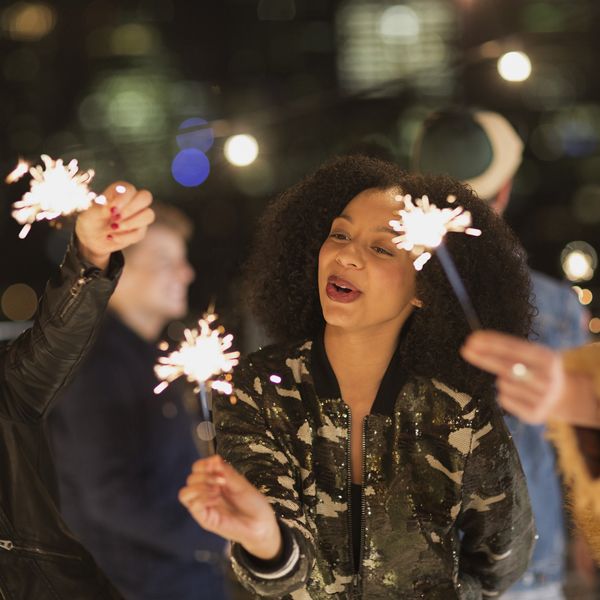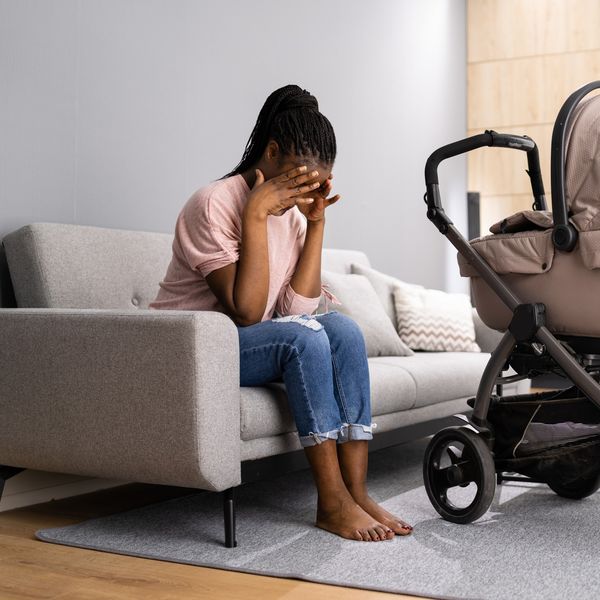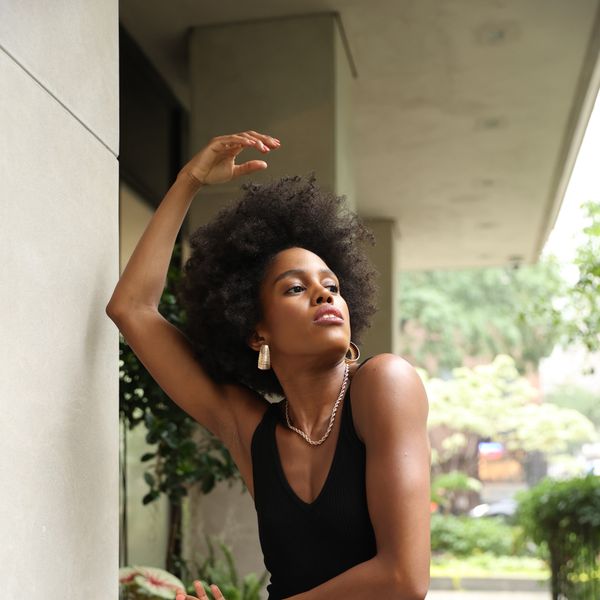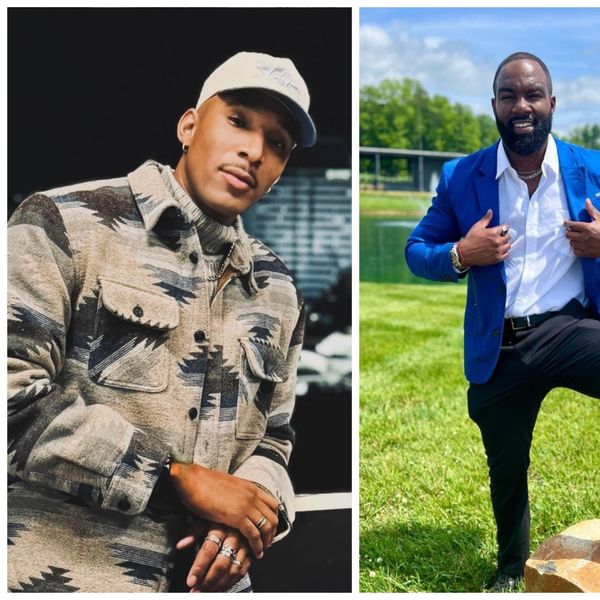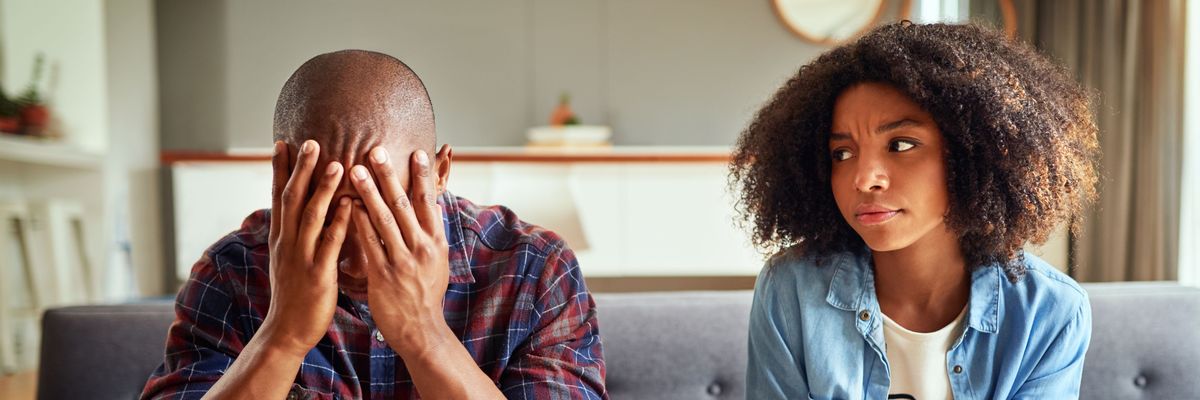Even One Is Too Many: The Current Sex Trafficking Crisis Among Black Women

A couple of nights ago, I got triggered (more on that in just a bit). Let me give a little history as to why. Back when I was in high school (a "Christian" high school at that), two guys—a Black male junior and a white male senior—pulled me into the back of the white senior's car. They handcuffed me, ripped open my shirt and bra and proceeded to sexually assault me. The Black junior had every intention of raping me, he even joked about making me give him some, but when the white senior saw the dead look in my eyes and noticed how silent I was—which was totally out of character for me—he convinced his "friend" to not do it. Instead, they drove me to the back of an old strip mall and, with my shirt still open, they dumped me outside of it. Luckily, another student's grandmother owned a beauty salon in that same strip mall, so I sought refuge there. The administration somehow convinced my mother and stepfather to not press charges. Instead, the guys were suspended for two days. That was it. They committed a crime yet they were able to go home and watch television for a couple of days while I returned to school feeling completely mortified, vulnerable and unprotected. It happened on a Wednesday prior to Thanksgiving. Every time this time of the year rolls around, I think about it.
That's why, as someone who is a survivor of sexual abuse, sexual assault and date rape (twice), I get triggered whenever I read headlines like "White South Carolina DJ Accused Of Sex-Trafficking Nearly 700 Black Girls" (how is this not international news, y'all?!) or I hear a quote from a Black male serial killer of Black female sex workers who rationalized his targeting based on the belief that no one would notice that that they were gone. Not notice? Or not care? Based on the lack of consistent coverage that the topic of sex trafficking among Black women is NOT receiving, I think there is a very fine line between the two. And that? That has me mad as hell.
It's not like this issue is some sort of conspiracy theory or an internet rumor that has gotten out of hand. Let's take Atlanta, for example. If you look on Wikipedia's page on sex trafficking in Georgia, it says this specifically about the city: "Atlanta is a major transportation hub for trafficking young girls from Mexico and is one of the fourteen U.S. cities with the highest levels of child sex trafficking. In 2007, the sex trade generated $290 million in Atlanta." That's not hard to believe when you are able to Google headlines like "Atlanta Hotel Employees Helped Sex Traffickers Avoid Police, Four Plaintiffs Allege in Federal Lawsuits", "Not For Sale: 100+ Minors Rescued In Child Sex Trafficking Op" and "Rampant Sex Trafficking Ignored at Atlanta-Area Hotels: Lawsuits". Have mercy.
Thankfully, I've never been a victim of sex trafficking. But as a survivor of sexual abuse and assault, there is absolutely no way that I can stand by and only read about what is going on. I have to give a voice to this ongoing evil. I have to do more than just "be triggered". Just like it takes a village to raise our children, it takes a village to protect our own as well. And so, I wanted to share just a few things that should make us all want to do whatever we can to shed light on what so many wish would remain in the dark.
Sex Trafficking Happens Daily. DAILY.
Even as I'm writing all of this this out, I caught the following headline—"Man Accused of Kidnapping, Sex Trafficking Girls". This monster was not in ATL; he is in Memphis. Sex trafficking is happening everywhere. Everywhere. It's been reported that between 20-40 million are victims of this form of modern-day slavery (which is exactly what sex trafficking is), that it's a $150 billion a year business, and that it flies under the radar because most victims go undetected; especially Black women. In fact, according to the National Center for Victims of Crime:
"Evidence suggests that Black youths ages 12 to 19 are victims of violent crime at significantly higher rates than their white peers. Black youths are three times more likely to be victims of reported child abuse or neglect, three times more likely to be victims of robbery and five times more likely to be victims of homicide."
Not only that but the article "Sex Trafficking's True Victims: Why Are Our Black Girls/Women So Vulnerable?" states this:
"Per the FBI, 59 percent of all juvenile prostitution arrests involve African-Americans. With law enforcement more likely to see a Black sex trafficking victim as a prostitute and not as someone needing help, trying to find solutions toward keeping our girls safe may require a radical examination of the core beliefs American society is currently based on."
One woman interviewed in the article said something that Cyntoia Brown-Long has stated based on her own sex trafficking survival story; she said that it wasn't until she read what happened to another woman that she even realized what sex trafficking was.
Sex Trafficking Is Way More Common than You Might Think
If you find that data hard to believe, take a moment to check out this sex trafficking survivor's recount. I'll give you the heads up that is absolutely heartbreaking to hear, although her courage and strength are absolutely mind-blowing. Black women amaze me; their resilience is like no other.
As Black Women, We Are Extremely Vulnerable When It Comes to Sex Trafficking
So, here comes my trigger point. Y'all, I wish that I could find it in my inbox, but a couple of weeks ago, a woman tweeted a story about hailing a Lyft or Uber (I can't remember) and the driver initially attempted to drop her off at an abandoned building instead of the airport. It wasn't until she persisted that he do otherwise that he took her to where she was actually supposed to be. Who knows what that man's motive was, but I thought about him when I watched a now viral video about a woman who has a similar story.
She took a Lyft but, rather than the driver taking her to her place of employment, he drove up behind a truck who had a man in it who opened up the gates to a warehouse. How did she escape? She got out of the car and ran. Watch the video. She is clearly shaken. Me? Triggered. And you know what? Anyone who is even remotely tempted to be skeptical or cynical about stories like these, they should read articles like "Las Vegas Police Trying to Combat Sex Trafficking in Ride Shares" and "Uber Trains Drivers On How To Spot Victims Of Human Trafficking". Again, just because this isn't getting the kind of coverage that it should, that doesn't mean it isn't happening. Lyft and Uber are not oblivious either. Not even a little bit.
So, What Should We Do About this...Whispered Epidemic?
Yeah. This a lot. A LOT. And please believe that I'm not sharing all of this to paralyze you with fear; it's more about simply heightening the awareness of this…whispered epidemic. Why do I call it that? It's because while sex trafficking among Black women and Black girls (Black boys too) isn't exactly something that is being silenced, it is most definitely something that we should be getting louder and louder about. Consistently and unapologetically so.
We can start by being proactive about some of the ways to protect ourselves while supporting the women around us—whether we know them personally or not.
1. Tweet and Retweet Missing People's Info
Another tweet that I recently saw simply asked, "Where are all of the Amber Alerts for all of these missing Black women?" I mean, and I'm saying. We all know that mainstream media is, let's say passively aggressively ignorant to a lot of what happens in our community. At the same time, what we also know is Black Twitter is a powerhouse that is close-to-impossible to rival. So, when you're on your social media, if someone comes up in your feed who is asking you to use your voice to spread the word about a missing person, please retweet it.
Even though there are murmurings of hoaxes going on that are purely for the sake of getting attention (which is absolutely deplorable), I would rather RT and be wrong than not do it and always wonder if I should have. All of the stories that go viral happen because we share the information. According to Statista, as of last year, there were 200,000 files of missing Black people. There are several other outlets that state between 64,000-75,000 Black women and girls are missing. These numbers are way too high to be wondering if someone is telling the truth or not when a picture of a loved one scrolls up on our timeline.
2. Share Insightful Survival Tips with Others
Even without all of the trafficking that is going on, I am not someone who parks next to vans or trucks. I don't care if I'm at the grocery store, a post office or the movies. I need to park where folks can see me get in and out of my car and large vehicles make that pretty difficult. If you think that leans on the side of being paranoid, I am totally fine with that. Besides, this video right here co-signs on why it really is a super smart thing to do.
Even though I don't have social media accounts, when I saw this video, I shared it. Every little bit of proactive insight helps. Whenever you get some, please make sure to pass it along as well.
3. If You’re a Guy, Check on Your Sistahs
I'm a single Black woman and the men in my life never let me forget it. One of my closest male friends is a retired Marine and he is perfectly fine letting me know that he knows how to keep tabs on me, whether I like it or not. My male friends request that I let them know if I'm heading out at night and, if so, to reach out when I return home so that they know that I'm safe. They're good dudes. They really are.
A man by the name of Minister Tony Bradford once said, "The most revolutionary thing that a Black man can do, living in a racist society, is to love, protect and respect his Black woman." Amen. The only thing that I would add to that is, Black men, we need you to love, protect and respect us whether we're in a personal relationship with you or not.
If you see a Black woman walking alone in a parking lot, watch to make sure that she gets there safely. If it seems like someone is harassing her in any way, don't be hesitant to ask, "Are you OK, sis?" Little gestures like this help to make us feel like we're not alone; like someone is truly looking out. (Which means ladies, when guys do stuff like this, don't automatically assume it's game. Give the benefit of the doubt that they are simply being gentlemen.)
4. If You’re a Non-Black Person, Please Do Your Part
Essence. Atlanta Black Star. The Root. If you go to your favorite search engine and put "Black human trafficking" in the search field, these are the publications that will have links on the topic. And what does they have in common? They are Black sites. My point?
If you're a non-Black person reading this and you're like, "Wow. That's horrible" but that response is not followed up with "What can I do?" then your sympathy is not enough. We need compassion and compassion is defined as being "a feeling of deep sympathy and sorrow for another who is stricken by misfortune, accompanied by a strong desire to alleviate the suffering".
Also share the missing reports that you see. And please, make the time to contact non-Black media outlets to alert them to what they seem to be overlooking far more than they should—missing Black women and girls. While they might claim to not know, they will end up looking real crazy out here if ALL OF US are writing them so much that we're like, "Oh, you know. We've been hounding you for weeks now." Not just Black people (which should be enough…SMDH). Everyone.
5. As Far as Ridesharing Goes…
I can count the amount of times that I've been in an Uber or Lyft. None of the times have I been uneasy but that doesn't mean that I wasn't aware of my surroundings either. In the effort to protect yourself—wait indoors until your ride comes. If you need to, take a picture of the license plate before getting into the vehicle (it's not illegal to do that) and then send it to a loved one or co-worker. Before shutting the door, make sure that there are no child safety locks on it (if there are…step out of the vehicle). Confirm that they know your first name and where you are going before leaving with the driver (if they are legitimate, they will know both). Remember, you are not catching a ride with a friend; you are paying for a service. So, if you feel uneasy for any reason, make sure to report the driver, even if you get to your destination safely. Do not offer up any personal details with the driver. Download a tracking app like Tego so that someone you trust can track where you are walking or riding to. Make sure that someone knows when you got into the car and when you got out (if you feel more comfortable remaining on the phone the entire time, that's cool too). Tips like these should help to put you more at ease if ridesharing is what you choose to do.
6. Protect Yourself. AT ALL TIMES.
A lot of people are talking more and more about arming themselves; especially Black women. If that is not something that you desire or are yet prepared to do, there are other ways to protect yourself. Pepper spray. Tactical pens. Stun guns. These are just some of the other things that you can carry while you're out 'n about. Several years ago, I took a self-defense class and it was one of the most self-empowering things that I've ever done. If money is tight and you need to take a free set of courses, click here for info on where to find what you need. If you must go out late at night, try and avoid being alone. Oh, and always carry a flashlight in your purse or get a key chain one. Two things that hate the light are rodents and criminals (which is pretty much interchangeable, if you ask me).
Y'all, we all know that so much more can be said. But it is my hope and prayer that this at least reminded you that none of us are alone in this and that there are things that can be done to fight back. Black sex trafficking is criminal, evil and an ongoing epidemic. But Black love, power and support is unstoppable. Let's not lose sight of our light…in the midst of what so many are trying to keep in the dark.
If you or someone you know is a victim of sex trafficking, contact the National Human Trafficking Hotline at 1-888-373-7888 or visit HumanTraffickingHotline.org.
Want more stories like this? Sign up for our newsletter here and check out the related reads below:
The Empowering Way This Rape Survivor Took Back Her Life
We Can't Only Demand & Refute Justice When It Serves To Help Our Men
Being Sexually Assaulted Led Me To Myself
My Partner Knew I Had Been Sexually Assaulted Before I Told Him
Feature image by Shutterstock
- Collateral Damage: How LA's fight against sex trafficking is hurting ... ›
- Trafficking is a Problem for Our Girls, Too — OURSELVES BLACK ›
- Who's disproportionately a victim of human trafficking? Young black ... ›
- African American human trafficking statistics will astound you! ›
- Gabrielle Union: Human Trafficking Disproportionately Affects Black ... ›
- White South Carolina DJ Accused Of Sex-Trafficking Nearly 700 ... ›
- Essence Special Report: Sex Trafficking In The Black Community ... ›
- Sex Trafficking's True Victims: Why Are Our Black Girls/Women So ... ›
This Is How To Keep 'Holiday Season Stress' From Infecting Your Relationship
Hmph. Maybe it’s just me, but it seems like there is something really weird happening in the fall season air (because winter doesn’t officially begin until December 21) that cuddle season is in full swing while break-up season is as well. In fact, did you know that break-ups are so popular during the holiday season that December 11 is deemed Break-Up Day?
The reasons why relationships shift around this time vary; however, I did both roll my eyes and chuckle when I read that a very popular one is because it’s an easy way to get out of getting one’s significant other a Christmas present. SMDH.
Anyway, I personally think that the less shallow folks out here may contemplate calling things “quits” or they at least distance themselves a bit from their partner (and what I’m referring to is serious relationships) due to all of the stress and strain that oftentimes comes with the holidays whether it be financial, familial, due to their tight schedules or something else.
Listen, I would hate for you and your man to miss the fun and happiness of experiencing this time of year, all because you are so overwhelmed or irritated that you can’t really enjoy it. That’s why I have a few practical tips for how to avoid allowing the typical holiday season stress from INFECTING your relationship.
Manage Your Expectations
 Giphy
GiphyUnmanaged expectations. If there is a main reason why the holiday season tends to be so stress-filled for so many people, I’d bet good money that this is the cause. And when you’re in a long-term relationship, expectations can manifest themselves in all sorts of cryptic and/or unexpected ways. You might have relatives who assume that you are going to be with them for Thanksgiving or Christmas when you have other plans in mind. You might be thinking that you are going to spend one amount for presents while your man is thinking something totally different. When it comes to scheduling, your signals may be crossed.
And you know what? To all of these scenarios, this is where clear and consistent communication come in. Don’t assume anything. Don’t dictate anything either. From now until New Year’s, mutually decide to check in once a week, just to make sure that you are both on the same page as it relates to the holidays and what you both are thinking will come along with it. The less blindsided you both feel, the less stressed out you will be. Trust me on this.
Set (and Keep) a Budget
 Giphy
GiphyOkay, so I read that last year, 36 percent of Americans incurred some type of holiday-related debt. Hmph. Last year, there was still some sense of normalcy in this country, chile, so I can only imagine what finances are gonna look like over the next several weeks. That said, since I don’t know a lot of people who don’t find being broke stressful, make sure that you and your bae set a budget and then stick to it this year — no ifs, ands or buts.
Because really, y’all — it doesn’t make sense to deplete savings and/or max out credit cards for a few days of giggles only to be damn near losing your mind because you don’t know how to make ends meet come Dr. Martin Luther King, Jr. Day.
And by the way, this tip doesn’t just speak to things like food and gifts; I also mean travel. If it doesn’t make a ton of sense (or cents) to be all over the place this year — DON’T BE.
Keep Matthew 5:37 at the Forefront
 Giphy
GiphyIf off the top of your head, you don’t know what Matthew 5:37 says, no worries, here ya go: “But let your ‘Yes’ be ‘Yes,’ and your ‘No,’ ‘No.’ For whatever is more than these is from the evil one.” That verse right there? Oh, it’s a boundaries lifesaver! I say that because do you see “maybe” or “I’ll think about it” in there? Nope. LOL. It says that you should tell people “yes” or “no” and leave it at that — and that complements Anne Lamott’s quote, “’No’ is a complete sentence” impeccably well. Yeah, you’ve got to remember that anything beyond a yes or no to a request is privileged information; you don’t owe anyone details or an explanation.
Besides, if you are really honest with yourself, when someone asks you something and you give a “Umm, let me think about it” kind of reply, more times than not, you already know what your answer is going to be — so why not let you both off of the hook? Give your response. Commit to that. And let everyone (including yourself) get on with their lives and schedules.
I promise you that when it comes to those holiday parties, you are pissing more folks off by not RSVP’ing or doing so and not showing up than just saying, “Thank you but not this year” off the rip.
Remember That Your Personal Space Is Privilege Not a Right
 Giphy
GiphyA friend of mine recently bought a new house and invited me over to come see it. He’s a single man with no children, so as I was taking in all of the space that he had, especially as I walked through his finished basement, I joked about relatives coming to live with him. “Hell no” and “absolutely not” were pretty much his immediate responses as he went on to say that some folks even had the nerve to be offended when he told them that he had no intentions on taking DNA in.
Ain’t it wild how people think that your stuff is their right? And yes, that brings me to my next point. Your home is your sanctuary space. If you want to host folks this year — cool. If not, ALSO COOL. Please don’t let folks (family included) guilt you into how they want you to act or even into what they would do if the shoe was on the other foot. You are not them — and as one of my favorite quotes states, “If two people were exactly alike, one of them would be unnecessary.” (A man by the name Larry Dixon said that.)
Hell, my friends? They know that I am good for sending them random things that they need or even want all throughout the year. Coming over to hang out at my pace, though. Uh-uh. Chalk it up to being a card-carrying member of the ambivert club yet I like keeping my living space personal — and I sleep like a baby, each and every night, for feeling that way.
Always remember that your space, your time, your resources, your energy and shoot, yourself period (including your relationship), are all things that are your own. You get to choose how, when and why you want to share them. The holiday season is certainly no exception.
Cultivate Some “You Two Only” Traditions
 Giphy
GiphyIt’s not uncommon for some couples to hit me up after the holiday season to “detox.” Sometimes it’s due to the financial drama (and sometimes trauma) that they experienced. Sometimes it’s because they allowed their relatives (especially in-laws) to get more into their personal business than they should’ve. More than anything, though, it tends to be because they didn’t get enough quality time together and so ended up feeling “disconnected.”
Please don’t let that happen. Listen, I’m not even a holidays kind of woman and yet, I will absolutely sit myself down with some hot chocolate and chocolate chip cookies to enjoy a Hallmark holiday film or two. Aside from the fact that most of them are lighthearted and sweet, I also like that they usually focus on couples loving on each other amidst all of the holiday beauty and ambiance — which is something that all couples should set aside some time to do.
Maybe it’s a vacation. Maybe it’s a staycation. Or maybe it’s my personal favorite, A SEXCATION. Whether it’s for a few days, the weekend or even overnight — don’t you let the holidays go by without setting aside time for you and your man to celebrate one another. Don’t you dare (check out “Are You Ready To Have Some Very Merry 'Christmas Sex'?”).
GET. SOME. REST.
 Giphy
GiphyI once read that 8 out of 10 people get stressed out over the holidays and 3 out of 10 lose sleep during to it — and when you’re stress-filled and sleep-deprived, that can absolutely lead to hypersensitivity, making mountains out of molehills and even not being in the mood for sex.
Your relationship can’t afford to go through any of this, so definitely make sure to prioritize rest. I don’t care how unrealistic it might seem during this time, sleep should never be seen as a luxury; it will always and forever be a great necessity.
That said, try to get no less than six hours of shut-eye in (check out “6 Fascinating Ways Sex And Sleep Definitely Go Hand In Hand”) and even ask your bae to take a nap with you sometimes (check out “Wanna Have Some Next-Level Sex? Take A Nap, Sis.”). Not only will sleep help to restore your mind, body and spirit but, when it’s with your partner, it’s an act of intimacy that can make you both feel super connected, even in the midst of what might feel like chaos.
___
Holiday season stress is real. Still, never give it the permission or power to throw your relationship off. Put you and your man first and let the holidays be what they are gonna be, chile.
Let’s make things inbox official! Sign up for the xoNecole newsletter for love, wellness, career, and exclusive content delivered straight to your inbox.
Featured image by Shutterstock
“Late” is an interesting word. I say that because, based on the situation, being late can actually be subjective.
For instance, if you agree to show up somewhere at 11:30 a.m. and you pop in at 11:45 a.m., you are absolutely late. No wiggle room there. Yet when it comes to something like an apology? I mean, when you factor in a definition for late like “occurring, coming, or being after the usual or proper time” — how do you determine when the proper time should be? Is it supposed to be when you want to hear it, or when someone is ready to offer it and actually means the words behind it?
And that is why I decided to put emphasis on the word “late” for today’s topic. Because if you and someone break up and they approach you, well after the fact, with an “I’m sorry,” if you struggle with whether or not to accept it due to the timing of it all, you should definitely ponder that a bit.
And as you’re doing so, it might help to read a bit deeper into what an apology should look and live like, even from an ex, regardless of when it shows up.
Your “late.” Or his right on time.
Three Things That a True Apology Consists Of
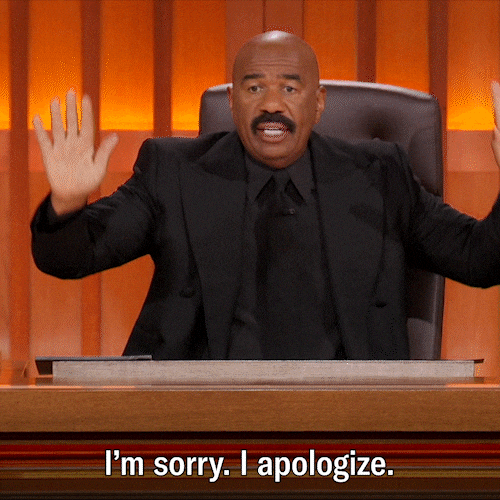 Giphy
GiphyIt’s kind of wild that when you work as a therapist/counselor/coach, a lot of people never really see you as human — and this can include your close relationships. What I mean by that is, it’s almost like they expect you to be free on-call therapy to the point where they “forget” to actually check on you sometimes.
Such is the case with one of my longest-running friendships. Even during the weeks between losing my mother and losing $4K (SMDH), she would just keep calling me to vent about her marriage. I finally got so fed up that I brought it to her attention that for the past couple of years, that is exactly what our friendship has been like: her venting, me listening without her being very invested in my life at all. In response, she texted me an apology — and boy, was it beautiful.
I’m not going to share the details of what she said; however, I am going to tell you three things that it consisted of because it’s what I believe ALL APOLOGIES should entail.
1. She took full ownership for what she believed that she did. I framed this point in this way because, something that everyone needs to forever keep in mind is the fact that two people start and, to a large extent, end relationships — and what I mean by that is, it’s never like one person was perfect and the other was the villain. That said, though, when someone is making an apology to another individual, they are going to own their part and articulate what that part is. It’s not gonna be a simple “My bad.”
It’s going to be “I am really sorry that I wasn’t there for you when you needed me” or “I apologize for taking you for granted” — something that sounds like they get the “offense” that transpired. By doing this, they recognize their missteps — and that is what puts people on the road to not repeating them.
2. She did not deflect or gaslight me. You know what one of the worst apologies are: It’s when someone says they are sorry and then follows it up with, “But you do it too” or “If you hadn’t done ‘A’, I wouldn’t have done ‘B.'” Justifying your actions is a surefire way to make someone believe that you don’t really think that you did something wrong (or that bad) in the first place. And really, how can they trust you (again) if that is how you feel? Oh, and don’t get me on gaslighting.
Ugh, ain’t nothing like someone claiming that they want to set things right with you, only to act like they don’t really get where you are coming from with the issues y’all were having in the first place. A good gaslight line in an apology: “If that is what you think happened, I apologize.” Yeah, you can keep that, jack. Never accept this kind of apology — because it isn’t one.
3. She addressed why she needed to make the apology in the first place. Wanna know one of the main reasons why I don’t trust people who don’t believe in having regrets (check out “Why Regret Might Not Always Be A Bad Thing”)? Did you know that apology means “a written or spoken expression of one's regret, remorse, or sorrow for having insulted, failed, injured, or wronged another.” How, as a human, do you think that you are out here not making any mistakes or poor decisions that you sometimes need to APOLOGIZE for? That is just…insane.
And one of the reasons why apologies are important is because if you feel bad about “failing” someone, it’s usually because you value them enough to want to keep them around. And yes, in my friend’s apology, she also explained why she didn’t want me to feel hurt in the way that she had hurt my feelings and what she would do to prevent that from happening in the first place.
So y’all, with all of this out of the way, before getting deeper into this topic? If an ex is hitting you up to apologize to you for something, please make sure that he hits all three marks of a true apology.
Now let’s keep going.
A Genuine Apology Should Also Include an Amends
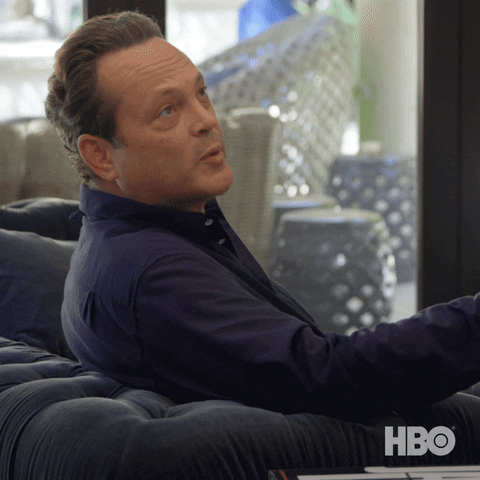 Giphy
GiphyA few years ago, I wrote an article for the platform entitled, “Heads Up: It's NOT An Apology If An Amends Isn't Made.” You know how I mentioned a second ago that a solid apology has no gaslighting in it? Hmph. Ain’t it wild how someone can do something that hurts or harms you and yet, they want you to just “hurry up and get over it”? GASLIGHTING.
Someone in my family, after unpacking years of abuse that I experienced at their hand, they had the nerve to say, “I’m not going to keep apologizing to you for this.” Hmm…Okay. So, how about you let me give you a consistent three months’ worth of the years of mistreatment that I experienced from you and then flippantly throw an apology your way. Let’s see how you feel about it. How much you believe that I am being genuine and sincere.
Listen — and please hear me GOOD on this: when someone really gets the magnitude of the pain or discomfort and inconvenience that they caused, they aren’t going to be fine with just saying that they are sorry for it; they are going to ask you what they can do to set things right.
It’s actually a part of the reason why I named the four children who I aborted (check out “Why I Named The Children I Aborted”) because I do have some real remorse for those decisions. Each of their names have an intentional meaning and I strive to leave out their purpose, through those names, on a daily basis. It’s a small way of making amends.
You know, back when my first book came out, my first love reached out, via email, to send me an apology. The apology hit most of the points that I mentioned earlier. Looking back, there wasn’t an offer to make an amends, though, and trust me, there was A LOT to make up for.
At the end of the day, amends means “reparation or compensation for a loss, damage, or injury of any kind; recompense” and while none of us should use bitterness, resentment or emotional stagnation as the “bar” for which we should expect amends to be made, if you’re trying to figure out just how sincere an ex is with their apology, if they want to do something to make things better, that’s a good sign.
There is a caveat, though.
Discern the Motives. Always.
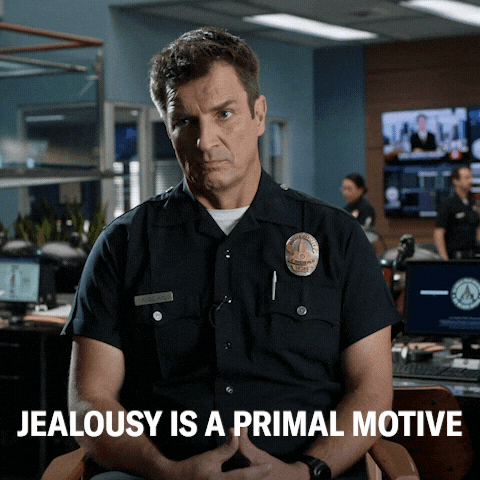 Giphy
GiphyEarlier this summer, I wrote an article for the platform entitled, “What's Your Motive For Sex? (It Reveals A Lot. Trust Me.)” Then, a few weeks ago, I wrote another article entitled, “As Cuffing Season Steadily Approaches, What The Heck Is 'Winter Coating'?” and boy, when I tell you that both of these complement this point really well? Goodness.
If you’ve never heard of the dating trend known as winter coating before, it’s basically when an ex creeps back up around cuffing season — and if you know what cuffing season is all about, you can absolutely connect the very probable motives behind those dots.
Now can there be exceptions? There are ALWAYS exceptions. Still, if you haven’t heard from your ex in years and here he comes a couple of weeks before Christmas, unless the two of you got together or broke up around the holidays, stay on potential “winter coating alert,” because it might not be about “building bridges” so much as getting into your bedroom.
That said, if it’s been a minute (six months or more) since you’ve heard from an ex and he suddenly reaches out to apologize, absolutely take out a moment to discern the motive — and shoot, feel fine with even asking what is causing him to make the move…now. If it’s in the spirit of the holidays and wanting to go into a new year with a clean slate, got it. If it’s because he’s been in therapy and realizes that he didn’t end certain things in his past very well, understood. If it’s because he didn’t like how the two of you broke up and he wants to try and make peace, that’s fair.
On the other hand, if you sense that he wants to rekindle something (check out “Nelly And Ashanti Are Giving It Another Shot? Here's What You Should Know About 'Ex Reconciliation'” and “I'm Thrilled That Ryan Destiny & Keith Powers Are Back Together. 5 Things Before Reuniting With Your Ex, Tho.” and “What Happens When 'The One Who Got Away'...Comes Back?”) — although that’s kind of another article for another time, do check that motive.
When someone apologizes, you should really be the only focus for them; not what they can get out of it on the back end. Listen, even if he hopes to get back with you (or back in bed with you), that shouldn’t be something that is discussed during the apology. If it is said or even implied, something about HIS MOTIVE is disingenuous. And if that is indeed the case, to a valid extent, so is he.
We All Should Give the Grace and Mercy That We Desire
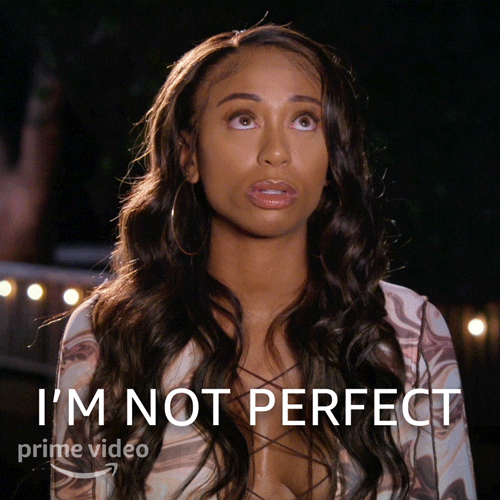 Giphy
GiphySooner than later, I’m going to write an article about forgiveness (beyond what I already have here). For now I’ll just say that if you are someone who thinks that other people don’t deserve forgiveness? That is either your pain or your ego talking and, either way, you can’t trust “their” judgment.
All of us mess up sometimes and if you are a karma (or you reap what you sow) believer, then you absolutely should want to extend others grace and mercy so that you can receive it in your own time of need (and you are absolutely delusional if you think a time won’t come, sooner than you probably think, that you will need it).
Besides, do you know all of the self-inflicted drama and trauma that comes from NOT forgiving others: higher blood pressure, insomnia, stress, anxiety, the higher risk of a heart attack, a weakened immunity, a greater risk for depression and anxiety — whatever he did, is it really worth all of this? Yeah, while a lot of people think that weaponizing forgiveness is empowering, really all it’s doing is putting themselves in harm’s way. Physically. Emotionally. SPIRITUALLY: “For if you forgive men their trespasses, your heavenly Father will also forgive you. But if you do not forgive men their trespasses, neither will your Father forgive your trespasses." (Matthew 6:14-15 — NKJV)
By the way, no one is saying that forgiving that man means that you have to allow him back into your life. After all, access is a privilege. Yet if he comes to you and acknowledges that he feels sorry for some things, for the sake of your own sanity, why not let him express it? Don’t wanna meet up or talk on the phone? Understood. Email and/or text are there for the taking. Don’t want to go back and forth? Who said that it needs to be a discussion or a debate?
All I know is, the more time you spend on this planet, the more you want to put out the energy that you want to come back. Forgiving others tends to make life easier. Not forgiving? Oh, the way that it boomerangs, sometimes in ways you never saw coming, chile. Dodge that kind of experience (and typically hard life lesson) if you can.
Yes, Better Late than Never
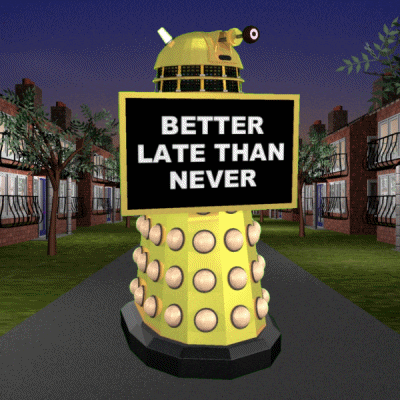 Giphy
GiphyToo late to apologize. Yeah, I don’t really know if there is such a thing (because forgiving and reconciling are not one in the same and some of y’all will catch that later). I’ll wrap this up with a story to prove my point.
Once upon a time, I knew a woman who was in a serious relationship and yet, whenever her boyfriend would bring up the possibility of marriage, she would stall him out. When I finally asked her what her deal was, she explained that she still harbored so much pain from the man before him that she didn’t fully trust that he was the real deal. About five months later, here came her ex with a thorough explanation for why he made some of the decisions that he did while they were together. Now that she had the full story, she was able to heal. She got married to her boyfriend that following year.
You see where I am going with this? Although your ex’s apology might be “late” as far as y’all’s relationship timeline, the timing may be BRILLIANT when it comes to true when and why you actually need it. Yeah, a Scripture that I adore is “Timing is the Father’s business” (Acts 1:7 — Message) and sometimes those apologies, in the grand scheme of things, are more on time than you could ever imagine; they’re when God deems you need them not when you want to have them.
____
It is Oprah Winfrey who once said, “True forgiveness is when you can say, "Thank you for that experience” and sis, if you remove the bitterness and anger and look deeper, there were valuable lessons, even in and from the most challenging relationships. And that is worth appreciating through forgiveness and, if need be, full and complete release.
Bottom line, should you accept an ex’s late apology? Absolutely.
What better way to illuminate your present on a whole ‘nother level.
Just as forgiveness always does.
TRUST ME.
Let’s make things inbox official! Sign up for the xoNecole newsletter for love, wellness, career, and exclusive content delivered straight to your inbox.
Featured image by Shutterstock

